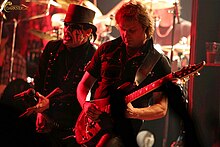
Heavy metal lyrics are the words used in songs by heavy metal artists. Given that there are many genres of heavy metal, it is difficult to make generalizations about the lyrics and lyrical themes. In 1989, two metal scholars wrote that heavy metal lyrics concentrate "on dark and depressing subject matter to an extent hitherto unprecedented" in any form of popular music.[1] Jeffrey Arnett states that metal songs are "overwhelmingly dominated" by "ugly and unhappy" themes which express "no hope" for the future.[2]
Deena Weinstein has proposed one way to analyze metal song themes is loosely grouping them into two categories: the Dionysian theme (a reference to the Roman God of wine), which celebrates "sex, drugs and rock and roll", partying, and enjoyment of life and the Chaotic theme, which involves dark subjects such as Hell, injustice, mayhem, carnage and death.[3] Not all metal genres fall into Weinstein's two theme model; for example power metal's lyrical themes often focus on fantasy and mythology, camaraderie and hope, personal struggles and emotions, among other themes. Another exception is pop metal bands, which replaced "gloom and doom" themes with "positive, upbeat" songs about romantic love and relationships, part of their goal of appealing more to female listeners.[4] In metal overall, the small number of metal songs about relationships are typically about unions that have "gone sour" long ago.[5]
The thematic content of heavy metal lyrics has long been a target of criticism. According to Jon Pareles, "Heavy metal's main subject matter is simple and virtually universal. With grunts, moans and subliterary lyrics, it celebrates a party without limits. The bulk of the music is stylized and formulaic."[6] Music critics have often deemed metal lyrics juvenile and banal, and others[7] have objected to what they see as advocacy of misogyny and the occult. During the 1980s, the Parents Music Resource Center (PMRC) petitioned the U.S. Congress to regulate the popular music industry due to what the group asserted were objectionable lyrics, particularly those in heavy metal songs.[8] The PMRC used music professor Joe Stuessy to testify against metal. Professor Stuessy alleged that heavy metal songs focus on violence, substance abuse, perversion, S&M, and Satanism.[9] Robert Walser analyzed 88 metal songs' themes to determine if Professor Stuessy's claims were valid. In Walser's analysis, the dominant theme in the metal songs was "longing for intensity"; he found that the negative themes described by Stuessy and the PMRC were uncommon.[9] Jeffrey Arnett analysed the lyrics from 115 metal songs: he found that the top three messages were "grim themes" about violence, angst and protest.[10]
Metal artists have had to defend their lyrics in front of the U.S. Senate and in courtrooms. In 1985, Twisted Sister frontman Dee Snider was asked to defend his song Under the Blade at a U.S. Senate hearing. In 1986, Ozzy Osbourne was sued because of the lyrics of his song Suicide Solution.[11] In 1990, Judas Priest was sued in American court by the parents of two young men who had shot themselves five years earlier, allegedly after hearing the subliminal statement "do it" in a Priest song. While the case attracted a great deal of media attention, it was ultimately dismissed.[8] In some predominantly Muslim countries, heavy metal has been officially denounced as a threat to traditional values. In countries such as Morocco, Egypt, Lebanon, and Malaysia, there have been incidents of heavy metal musicians and fans being arrested and incarcerated.[12]
- ^ Hatch and Millward (1989), p. 167
- ^ Sylvan, Robin. Traces of the Spirit: The Religious Dimensions of Popular Music. NYU Press, 2002
- ^ Weinstein, Deena. Heavy Metal: The Music and Its Culture. Da Capo Press, 2009. p. 35
- ^ Bennett, Andy. Cultures of Popular Music. McGraw-Hill Education (UK), 2007. p. 41
- ^ Weinstein, Deena. Heavy Metal: The Music and Its Culture. Da Capo Press, 2009. p. 36
- ^ Pareles, Jon. "Heavy Metal, Weighty Words" The New York Times, 10 July 1988. Retrieved on 14 November 2007.
- ^ Gore, Tipper (2007). "The Cult of Violence". In Cateforis, Theo (ed.). The Rock History Reader. Taylor & Francis. pp. 227–233. ISBN 978-0-415-97501-8. Retrieved 30 August 2015.
- ^ a b See, e.g., Ewing and McCann (2006), pp. 104–113
- ^ a b Walser, Robert. Running with the Devil: Power, Gender and Madness in Heavy Metal Music. Wesleyan University Press, 2014.
- ^ Sylvan, Robin. Traces of the Spirit: The Religious Dimensions of Popular Music. NYU Press, 2002. p. 157
- ^ Elovaara, Mika (2014). "Chapter 3: Am I Evil? The Meaning of Metal Lyrics to its Fans". In Abbey, James; Helb, Colin (eds.). Hardcore, Punk and Other Junk: Aggressive Sounds in Contemporary Music. Lexington Books. p. 38.
- ^ Whitaker, Brian (2 June 2003). "Highway to Hell". Guardian. Retrieved 3 March 2009. "Malaysia Curbs Heavy Metal Music". BBC News. London. 4 August 2001. Retrieved 3 March 2009.